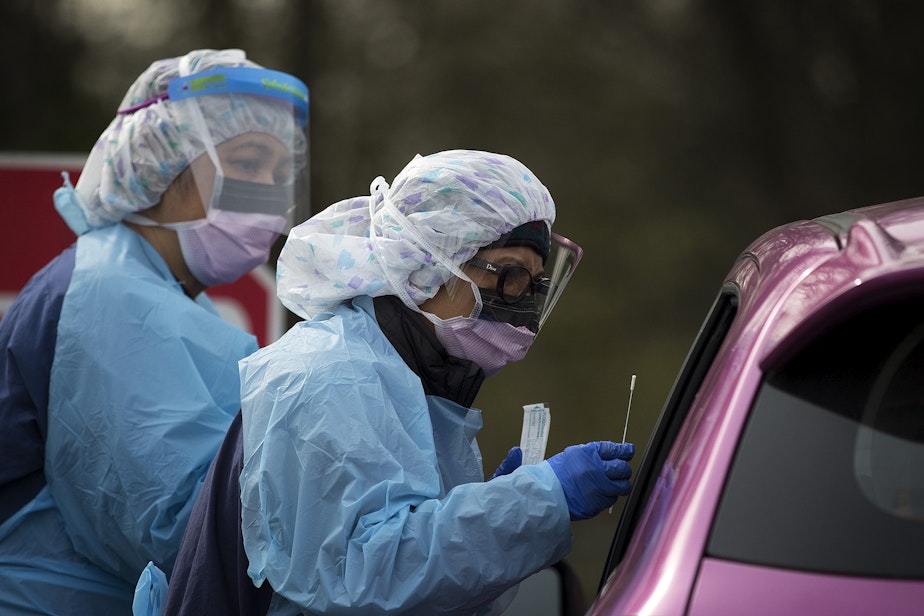'The message is changing': These Seattle clinics say they now test lower-risk people and wide range of Covid-19 symptoms

Many Seattle-area testing sites are encouraging more people to get testing appointments for Covid-19, thanks to increased testing supplies and an expanded list of qualifying symptoms.
For months, people in the Seattle area have complained that it was hard to get referred for Covid-19 testing unless they were in a high-risk group or had severe symptoms.
“While previously we were asking people to stay home unless they were very sick, that has now changed," said Dr. Meena Mital, chief medical officer for Neighborcare Health.
Mital said the previous, stricter messaging should no longer prevent ill people from seeking tests and care.
Neighborcare clinics are now using the broader list of symptoms the state recommended for Covid-19 testing this week. Along with cough, shortness of breath or difficulty breathing, the state recommended that people with two or more milder symptoms get tested, including fever, chills, repeated shaking with chills, muscle pain, headache, sore throat, or new loss of taste or smell.
The priority is still people in high-risk environments or who are particularly vulnerable to the disease due to age or health condition, but lower-risk people are also encouraged to get tested if they have multiple symptoms or more significant signs of illness.
Sponsored
"There are more testing supplies available, and more ability in our community to manage people who have Covid-positive tests," Mital said.
Neighborcare has received additional swabs and other testing supplies from LabCorps, the lab that processes its tests, as well as from Public Health - Seattle & King County.
International Community Health Services also reports plenty of testing capacity, and has an even broader set of qualifying symptoms than the state lists - including conjunctivitis, fatigue, and nausea.
"All of these are symptoms that could be indicative of a Covid infection, and if individuals have at least two of those symptoms, we will generally not turn them away," said Lisa DiFedele, the infection control and prevention administrator for ICHS.
"At first, we had to be very, very judicious in our testing, because there weren't that many test kits available," said DiFedele. Now, "we seem to have ample supplies, so we're able to test more widely."
Sponsored
Likewise at Kaiser Permanente Washington, Dr. Barbara Detering said she's confident they have enough testing supplies at this point to meet their needs.
Detering, who is the clinical operations lead for the Covid-19 pandemic, said Kaiser also expanded its criteria for who is recommended for testing this week, and is no longer focusing on people in high-risk groups.
"We still are not recommending testing for people who are asymptomatic, or who have very mild symptoms," Detering said. "But if you have flu-like symptoms, which include cough, fever, shortness of breath, diarrhea, headache, chills, muscle aches, we would very much want you to call our consulting nurse service to have those symptoms evaluated," she said.
Testing protocol have also broadened at the Veterans Administration Puget Sound due to the CDC's expanded criteria, which also changed this week.
"We have enough testing supplies to cover the work we need to accomplish," said VA spokesperson Tami Begasse, including testing residents at Veterans Homes in Port Orchard and Orting.
Sponsored
The VA and Kaiser process tests in-house within 24 hours. At Neighborcare, turnaround times are often two days - but ICHS reports three- to five-day waits for test results.
"It is a lot faster than what it was in the beginning, but still is not optimal," said DiFedele. "In those three days, we're not able to begin any sort of contact tracing," she said, and determining who an infected patient has come in contact with and possibly infected.
While Kaiser only tests its members, other clinics, including Neighborcare and ICHS, test anyone in the community.
Neighborcare is testing people by appointment in tents at its Rainier Beach, High Point, Meridian and Vashon clinics. ICHS tests patients at drive-up sites in Seattle's Chinatown-International District and Shoreline.




